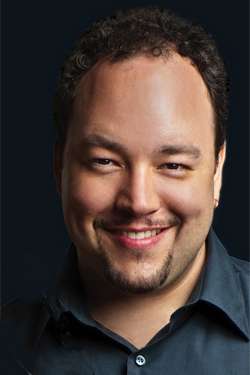|
Back
The Joy of Joyful Music New York
Di Menna Center for Classical Music
03/25/2013 -
“American Stories”
Steven Mackey: Groundswell
Robert Paterson: Looney Tunes (New York premiere)
Sean McClowry: Concerto for Double Bass and Orchestra (New York premiere)
David Ludwig: Flowers in the Desert
Alejandro Rutty: Black Box Bossa
Hsin-Yun Huang (Solo Viola/Solo Harmonica), Sean McClowry (Solo Double Bass)
American Modern Ensemble (AME): Robin Zeh, Victoria Paterson (Violins) Jessica Meyer (Viola), Dave Eggar, Laura Bontrager (Cellos) Roger Wagner (Double Bass), Sato Moughalian (Flute); Benjamin Fingland (Clarinet), Keve Wilson (Oboe), Amie Margoles (Horn), Scott Kuney (Electric Guitar), Jeremy Justeson (Saxophone), Matthew Ward (Percussion) Stephen Gosling (Piano), Steven Mackey, Robert Paterson, Ena Shin (Conductors)

The Four Looney Tunes (© Warner Brothers)
Like a Renaissance folio of Humors, the American Modern Ensemble presented a quintet of moods last night. Specifically, Disintegrations, Obsequies, Hysteria (the funny kind), Meditative Stasis, and Energy.
The key word of the American Modern Ensemble, though, is always energy. The audience at Di Menna Center had the enthusiasm, de facto moderator, Robert Paterson had the humor, and the five composers, all present and all participants in a discussion of their music, had, within their different spheres, an ebullience for their tasks, ranging from the quiet sublimity to the highly enthusiastic.
The sublimity was provided by double-bass artist/composer Sean McClowry, whose two-movement Concerto had some of the most sheerly gorgeous timbres. Yes, he gave every permutation of his instrument, multiple strumming/melodies, complex pizzicati/bowing and sometimes jazzy double bass riffing and cadenzas. But his was far more than a showoff Dragonetti-style concerto. His opening simple solo continued with the most beautiful background humming by cello and other instruments. The music had a feeling of natural sounds, of a nobility which far transcended mere great playing, conducted by Ena Shin.
The double-bass has few dedicated concerti. Mr. McClowry’s piece really must make its way into that rarefied pantheon.

H-Y Huang (© http://www.hsinyun.com)
That other instrument, too often the butt of jokes, is the viola, and Hsin-Yun Huang soloed in a pair of excellent pieces, both distinctly programmatic.
The first was David Ludwig’s Flowers in the Desert, the contemplation of a modern lynching. A bungled robbery, where the perp was shot five times and the community turned in rage on the bungled robber. Mr. Ludwig offered a multiple sermon on the matter, beginning with the wailing of clarinetist Benjamin Fingland, his back to the audience. He continued with even more grim contemplations, including a Renaissance song by Josquin and sections depicting the shots themselves. It was Hsin-Yun Huang, though, who, at the climax produced the most searingly beautiful short statement.
Yet it was the concerto written for her by Stephen Mackey which was spellbinding. Groundswell took a form like Strauss’ Alpine Symphony, seven movements depicting Mr. Mackey’s approach to an Italian mountain, the climb, the thin air, the view from the back, and the return. Each movement was on the cusp of pictorialization: the hasty steps back, the high thin harmonics of the “thin air” (with its inhale-exhale harmonica played by the soloist) and of course the grandiosity of the view from the peak.
Yet above all, it was the violist who played, without a break, with assuredness, power, and that same searing beautiful tone of Flowers in the Desert. Like the previous Concerto, this should go into the category of splendid works for the technically adept viola.

R. Paterson (© Daniel Dottavio)
I confess, admit, must give a multiple (and gleeful) Mea culpa that I didn’t listen much to Robert Paterson’s Looney Tunes. He is a marvelous composer, and the last time I heard his music, Forest Whispers, written for the great marimba player Makoto Nakura, it was a lovely picture.
Here, though, he was overwhelmed by Warner Brother pictures, hundreds of gels– from four Looney Tunes characters. Taz (the Tasmanian devil), Foghorn Leghorn (the “Suth’n Senator” inspired by Fred Allen), Tweety Bird (“I tawt I taw a puddy cat”) and Road Runner. Mr. Paterson conducted his orchestra with glee, 1940’s style guitar saxophone and bumpety-bump right rhythms. But the cartoon excerpts were so riotous, zany, hilarious and unexpected (they included some real tweety birds, real Tasmanian Devils, as well as music sheets) that I couldn’t take my eyes off them.
Looney Tunes in France would probably be called “L'art de la violence magnifique”, but here we Philistines call them simply cartoons. C’est vraiment dommage.
The French might also label the opening piece, Alejandro Rutty’ Black Box Bossa a work of danceable cubism. That is, countlews fragments, phrases, rhythms of Bossa Nova music were played simultanously, in canon, off-center, convoluted, with lightning appearance and disappearance. Methinks the late Stan Getz would have been amused. As for myself, I was knocked sideways, couldn’t quite get my aural balance in sync, and found it delightful.
As did I find the entire American Modern Ensemble a pure delight. Yes, young instrumentalists do have an ease of technique, a sureness of mastering even the most difficult passages as if they’re simple scale. More important, the choice of works last embraced moods, emotions and compositional skills epitomized by the comment of composer MacKey.
Most great visual experiences, he said, are tragic because they’re “ephemeral.” Thus, his fortune that in being a composer, he can put those experiences into something approaching permanent joy.
Harry Rolnick
|